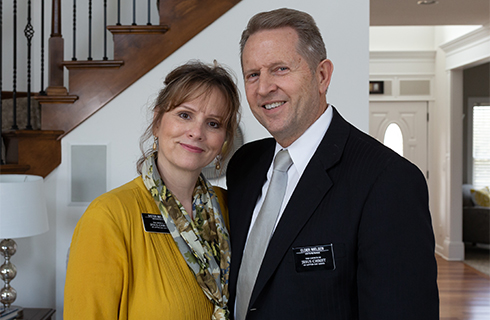
Elder Todd and Sister Camille Nielsen are Church-service missionaries serving in the Addiction Recovery Program (ARP) in the Des Moines Iowa Mount Pisgah Stake. As group leaders, Elder and Sister Nielsen lead group meetings once a week, helping individuals who struggle with addiction find access to the healing power of Jesus Christ’s Atonement.
A typical meeting looks something like this. First, the Nielsens welcome with open arms any who come seeking help overcoming an addiction. They love these individuals and seek to lead them to the Savior.
During the first part of a meeting, the Nielsens introduce and discuss one of the steps in the 12-step program. Then they turn the time over to the facilitator, another Church-service missionary who has completed the program as a recovering addict and can connect with those in the group. That facilitator then leads a candid discussion with group members about challenges and successes with overcoming addiction.
Because the topics and emotions in an ARP meeting are so deeply personal, anonymity is carefully guarded, even for the facilitator. But the Nielsens are quick to point out that anonymity provides a safe place for people to find healing.
Together, the Nielsens and the facilitator help group members work through the 12-step program outlined in the ARP guidebook as they seek hope and healing through the mercy, grace, and forgiveness of Jesus Christ. But the path isn’t always easy. After working with several groups, the facilitator has seen a few common hurdles people face on the path to healing. These hurdles include:
- A fear of public humiliation. (Many avoid speaking to bishops, concerned that they will be released from callings or even excommunicated.)
- A fear of losing their families.
- A fear of recognition. (Many worry that someone will recognize them and tell others.)
- A fear that they can never be healed.
Those fears, however, are usually never realized. As the facilitator shares, “It’s been my experience that when there’s an unknown, we assume the worst. But in every case, you will feel more love and mercy and forgiveness than you thought possible.” In fact, he points out, “I have found that this program works for every single person that works this program.” It takes work and commitment, but the results are worth it.
Through their missionary service, the Nielsens have learned much about themselves and the Savior. They have learned the importance of not judging but loving as the Savior loves. They’ve learned that even if someone is doing something that may be causing spiritual, emotional, or physical harm, the Savior is always there for that person. They’ve learned that if the Savior can love everyone where they are, then so should we. And they’ve learned that they want to do more to lead people to Him.
Elder Nielsen explains, “I can’t fix them. I haven’t experienced everything they have. But the Savior has. So my job is to bear testimony of the Savior and that He can change them.”
Sister Nielsen agrees. “Our problems aren’t always easily solved,” she shares. “We need more access to the Savior’s Atonement. That’s what these meetings offer—more access to the Savior.”
What began as a simple call to serve as Church-service missionaries leading an ARP group has become, for Elder and Sister Nielsen, an opportunity to help others on the path to healing through the Atonement of Jesus Christ.
If you are interested in learning how you can serve as a Church-service missionary in the Addiction Recovery Program, explore opportunities today.
